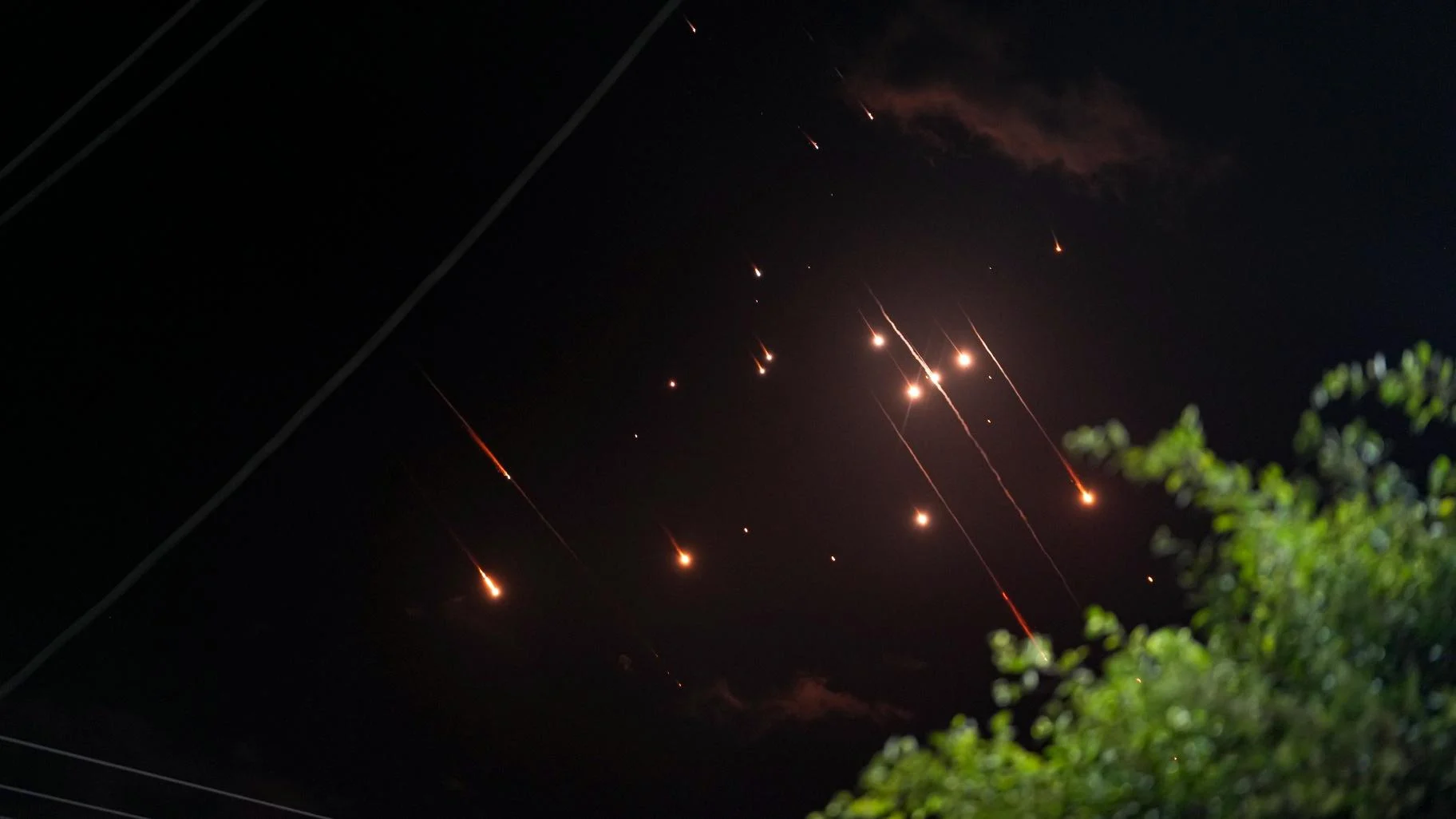Iran launched at least 180 missiles into Israel on Tuesday night, in a significant escalation of the ongoing conflict between Israel and Iran, as well as its Arab allies. This latest barrage threatens to push the Middle East closer to a region-wide war.
Iran’s Islamic Revolutionary Guard Corps (IRGC) claimed the attack of 180 missiles was retaliation for Israel’s recent strikes on Hezbollah in Lebanon. Hezbollah, an Iran-backed militant group, has been firing rockets into Israel since the onset of the Gaza war. Earlier in the day, Israeli forces launched a limited ground incursion into southern Lebanon, aiming to push Hezbollah fighters further away from the border.
As air raid sirens blared, Israelis scrambled for bomb shelters while the country’s Iron Dome missile defense system intercepted several of the missiles. Nevertheless, some projectiles managed to strike central and southern Israel. Two Israeli citizens sustained minor injuries from shrapnel. In the West Bank, a missile reportedly killed a Palestinian man near Jericho, though the attack’s origin remains unclear.
Israeli Prime Minister Benjamin Netanyahu responded sternly, vowing to retaliate against Iran. “Iran made a big mistake tonight, and it will pay for it,” Netanyahu said late Tuesday. The Israeli government, along with military officials, indicated that the response would come at a time and place of their choosing.
The Situation on the Ground
The barrage lit up the skies over Jerusalem and Tel Aviv. Residents witnessed streaks of missile fire crisscrossing above them. The Israeli military, led by spokesman Rear Admiral Daniel Hagari, confirmed that their air defenses intercepted many of the 180 missiles. Despite the interceptions, damage and injuries were reported in various areas across Israel.
This barrage of 180 missiles follows weeks of intense fighting between Israel and Hezbollah, alongside the war in Gaza. The Israel Defense Forces (IDF) have been conducting airstrikes and limited ground operations in both Gaza and Lebanon. Hezbollah has also sustained losses, with Israeli airstrikes killing more than 1,000 people and displacing nearly one million in recent weeks, according to Lebanese officials.
International Reactions
The attack drew immediate international reactions. EU foreign policy chief Josep Borrell condemned the Iranian attack, calling for restraint from all sides. “This cycle of attacks risks fueling an uncontrollable regional escalation,” Borrell said, while reaffirming the EU’s commitment to Israel’s security.
The UK Defense Secretary, John Healey, confirmed that British forces played a role in defending Israel during the missile barrage. The US State Department confirmed that forces launched nearly 200 missiles and that the United States assisted in Israel’s defense. President Biden also confirmed US involvement, noting that US destroyers in the region launched missile interceptors.
AIPAC, the pro-Israel lobbying group in the US, immediately called on supporters to pressure their elected officials to support Israel. “Congress must speak out to unequivocally condemn this attack and reaffirm America’s strong support for our ally,” read their statement.
Meanwhile, French President Emmanuel Macron condemned the Iranian attack and ordered French military forces in the Middle East to mobilize to counter the Iranian threat. Macron also called for an end to Israeli operations in Lebanon, citing the high civilian toll. Australia’s Prime Minister, Anthony Albanese, similarly condemned Iran’s missile barrage and expressed concern over escalating hostilities.
Rising Tensions and Warnings
Inside Israel, political leaders have promised a severe response. Defense Minister Yoav Gallant stated that Iran had not learned from past conflicts and would now pay a “heavy price.” Israeli Ambassador to the UN, Danny Danon, accused Iran of trying to encircle Israel in a “ring of fire” and urged the international community to condemn Iran’s actions.
Former Israeli Prime Minister Naftali Bennett described Iran’s actions as the “greatest opportunity in 50 years.” He stated that this opportunity could lead to the destruction of Iran’s nuclear program and its key energy infrastructure. Several Israeli leaders also expressed their determination. Finance Minister Bezalel Smotrich and opposition leader Yair Lapid vowed that Israel would prevail in the escalating conflict.
In the US, the Biden administration reiterated its full support for Israel. US Defense Secretary Lloyd Austin praised the coordination between Israeli and US defense forces during the Iranian attack. Vice President Kamala Harris, who was briefed in the White House Situation Room, reaffirmed US-Israeli cooperation, while several prominent Republican lawmakers called for US military strikes against Iran.
Senator Lindsey Graham said Iranian oil refineries should be targeted as part of a coordinated US-Israeli response, while Senator Marco Rubio urged for a “disproportionate” retaliation against Iran.
Broader Middle East Implications
The missile strike on Israel has raised the risk of a broader regional conflict. Analysts like Ali Vaez from the International Crisis Group warned that Israel might see this moment as an opportunity to target Iran’s nuclear facilities. “US forces are already in the region shielding Israel, and for Israel, this is potentially a once-in-a-generation opportunity to take care of a major threat,” Vaez told Al Jazeera.
The conflict has also spilled into neighboring countries. In Jordan, missile debris landed in the country, causing minor injuries and damage. The Jordanian government reiterated that it would not allow the country to become a battlefield for regional conflicts. Meanwhile, the UAE-based airline FlyDubai temporarily suspended flights to Jordan, Iraq, Iran, and Israel in response to the escalating situation.
The UN Security Council has scheduled an emergency meeting for Wednesday to discuss the rapidly unfolding events. In a letter to the council, Israel’s UN envoy, Danny Danon, called for the designation of Iran’s IRGC as a terrorist organization, citing the attack. As the world watches closely, the risk of further escalation in the Middle East remains alarmingly high, with all sides bracing for what could be an increasingly dangerous conflict.



![Afghan men search for victims after a Pakistani air strike hit a residential area in the Girdi Kas village, Nangarhar province on February 22, 2026. [Aimal Zahir/AFP/Getty Images]](https://southasiatimes.org/wp-content/uploads/2026/02/gettyimages-2262391441.webp)


